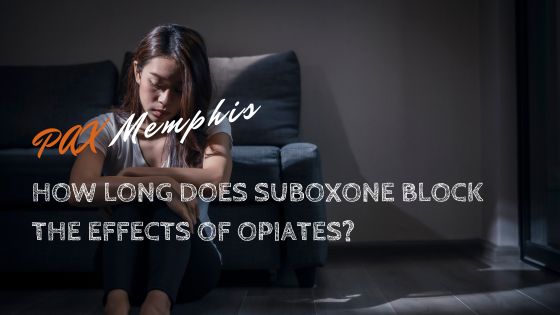Suboxone is a prescription medication that is used to treat opioid addiction. It is used as part of many medication-assisted treatment (MAT) programs to provide comfort during detox and increase one’s ability to stay sober. One unique feature of Suboxone that sets it apart from other treatment medications is its ability to block the effects of opiate drugs, reducing the potential for relapse.
What is Suboxone?
Suboxone is a brand-name prescription medication that contains buprenorphine and naloxone. It is prescribed during detox and addiction treatment programs to help individuals overcome opioid dependency. It works by alleviating opioid withdrawal symptoms and reducing cravings for opioid drugs.
Buprenorphine, the component in Suboxone that blocks other opioids, is a partial opioid agonist. It works by binding to the brain’s opioid receptors and activating them without producing the high associated with full opioid agonists, like methadone or oxycodone.
Unlike full opioid agonists like heroin or oxycodone, which can continue to produce increasing levels of respiratory depression and euphoria with higher doses, buprenorphine has a ceiling effect. This means that once a certain dose of buprenorphine is reached, further increases in dosage do not produce a greater effect on opioid receptors in the brain. The ceiling effect helps reduce the potential for Suboxone misuse.
The naloxone component is in Suboxone to further discourage misuse of the medication. While it remains inactive when taken orally, it can cause people to experience sudden and severe withdrawal symptoms if they attempt to inject the medication.
How Does Suboxone Work?
Suboxone comes in the form of a sublingual film or tablet that dissolves when placed under the tongue. It is absorbed into the bloodstream. Suboxone reaches peak efficacy in the body 40-120 minutes after it is taken. In total, its effects can last around 24 hours or more.
Common side effects of Suboxone include:
- Nausea
- Vomiting
- Headache
- Sweating
- Constipation
- Insomnia
- Dizziness
- Blurred vision
- Fatigue
- Numbness or tingling
- Mouth numbness
- Painful tongue
- Difficulty concentrating
- Anxiety
- Depression
- Irritability
- Back pain
Despite its potential to cause side effects, Suboxone can help individuals who are struggling with opioid addiction. It is given during detox because it can greatly reduce withdrawal symptoms and cravings, aiding in the recovery process.
Suboxone is most effective when combined with a complete treatment program that includes counseling and behavioral therapy. This approach is known as medication-assisted treatment (MAT).
Understanding Affinity and Opioid Blocking
Affinity is a term used to describe a drug’s ability to attach to certain receptors in the brain. When it comes to buprenorphine, it binds to opioid receptors, and it has an extremely high affinity, meaning it binds to opioid receptors easily and strongly.
Buprenorpine’s affinity is so strong that no other opioid drugs can knock it off. If a person were to take an opioid like heroin or oxycodone while they are taking buprenorphine, the heroin or oxycodone molecules would be unable to attach to and activate opioid receptors. Instead, the buprenorphine continues to occupy opioid receptors, preventing other drugs from producing feelings of euphoria or a “high.”
Some people may try to take high doses of opioids to overcome the effects of Suboxone. However, this is incredibly dangerous and may lead to an overdose. If you are taking Suboxone, you should never try to overcome the blocking effects of it by taking a higher dose.
How Long Does Suboxone Block Opiates?
Buprenorphine has a very long half-life of about 48 hours, meaning it stays in the body for extended periods. A single dose of Suboxone can block the effects of full opioid drugs (including heroin, oxycodone, fentanyl, morphine, and others) for at least 24 hours. This means if full opioids are taken within 24 hours of Suboxone, they will not work.
People who have been taking Suboxone regularly for an extended length of time may have blocking effects for up to 60 hours after their last dose.
Factors Affecting Suboxone’s Ability to Block the Effects of Opioids
Suboxone’s ability to block the effects of opioids can vary among individuals based on various factors, such as:
- Weight
- Metabolism
- Suboxone dosage
- Tolerance level
- Length of Suboxone use
- History of drug abuse
In some people, the blocking effects of Suboxone can last for up to 60 hours.
Find Out if Suboxone Treatment is Right for You
If you or a loved one are struggling with opioid addiction, Suboxone may be a beneficial aspect of your treatment plan. When combined with counseling and behavioral therapy, Suboxone can help promote long-term sobriety. To learn more about opioid addiction treatment with Suboxone or to find a Suboxone clinic near you, please contact our team at PAX Memphis Recovery Center today.
Medically Reviewed: September 25, 2019

All of the information on this page has been reviewed and verified by a certified addiction professional.










